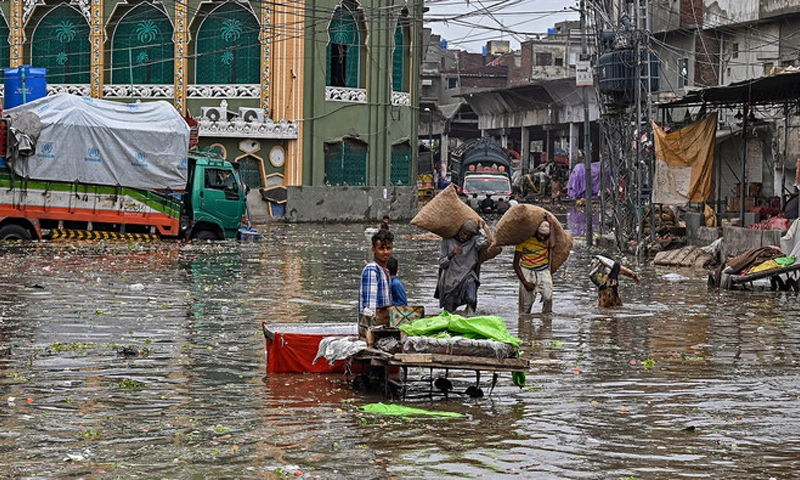Islamabad 12 August: Pakistan’s Punjab province is bracing for potential flooding in its major rivers, including the Sutlej, Ravi, Chenab, and Jhelum, as a seventh spell of monsoon rains sweeps through the region, compounded by fears of water releases from Indian dams.
The Provincial Disaster Management Authority (PDMA) issued an urgent flood advisory on Tuesday, warning of rising water levels due to heavy rainfall in Pakistan’s upper catchment areas and the possibility of India discharging water from its reservoirs within the next 72 hours.
The PDMA reported that India’s Bhakra, Pong, and Thein dams, located on the Sutlej and Beas rivers, have reached 61%, 76%, and 64% of their capacity, respectively, raising concerns about potential water releases that could exacerbate flooding in Pakistan’s eastern Punjab.
A PDMA spokesperson noted an “unusual increase” in water levels in these dams, with a particular risk of low to medium-level flooding in the Sutlej River at Ganda Singh Wala within the next three days. The Chenab River is also under watch, with a warning issued for medium to high-level flooding at Marala Headworks.
The current monsoon spell, which began on August 12 and is expected to intensify through August 13, has already triggered low-level flooding in the Indus River at Tarbela, Kalabagh, and Chashma barrages, and in the Chenab River at Marala. Tributaries such as Nala Dek in Kangra and Nala Bein in Shakargarh are also experiencing low to medium flood levels. Urban centers like Lahore, Rawalpindi, Gujranwala, and Sialkot face risks of flash flooding due to poor drainage systems, with the PDMA urging local authorities to remain on high alert.
READ MORE: India Violates Indus Water Treaty Many Times, Report
The alert follows a deadly monsoon season that has already claimed over 300 lives across Pakistan, with Punjab reporting 63 deaths. Infrastructure damage, landslides, and flash floods have battered regions like Gilgit-Baltistan, where 10 people were killed last month. Prime Minister Shehbaz Sharif recently distributed Rs1 million compensation cheques to families affected in Gilgit-Baltistan, emphasizing Pakistan’s vulnerability to climate change and the need for advanced warning systems.
Tensions over water management have escalated since India’s April 2025 decision to suspend the Indus Waters Treaty (IWT) following a deadly attack in occupied Kashmir, which New Delhi attributed to Pakistan. Posts on X have highlighted concerns, with some Indian users noting that the opening of gates at dams like Baglihar on the Chenab and Pong on the Beas could impact Pakistan’s rivers, though these claims remain unverified.
Pakistan’s Foreign Office has called India’s suspension of the IWT an “act of war,” and the recent Permanent Court of Arbitration ruling reaffirmed Pakistan’s rights to the unrestricted flow of western rivers under the treaty.
PDMA Director General Irfan Ali Kathia has ordered the evacuation of residents and livestock from riverbanks and low-lying areas, with Rescue 1122 teams on standby and control rooms operating 24/7. The public has been advised to avoid swimming in rivers and canals, follow official updates, and contact the PDMA helpline (1129) in emergencies.
As Punjab braces for the dual threat of monsoon rains and potential water releases from India, authorities are mobilizing to mitigate the risk of widespread flooding, drawing on lessons from last year’s devastating floods that submerged thousands of villages and caused significant loss of life and property.









